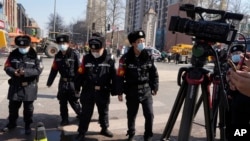Chinese journalists often considered Beijing’s mouthpieces appeared to be squeezed out of that role when authorities physically intervened on Wednesday as several state media reporters gathered news or reported live at the site of a deadly explosion in Hebei province.
The actions of local authorities prompted a swift response from the All-China Journalists Association, which issued a statement defending the role of journalists in Chinese society to act professionally.
The death toll from an explosion that tore through a four-story building has risen to seven, with dozens more injured, state media reported.
Local authorities told Chinese media on Thursday that the explosion was caused by a leak in an underground gas pipe and not a commercial entity inside the building, as previously reported.
Within hours of the explosion, Chinese reporters from multiple media outlets rushed to the scene, including reporters from CCTV, a major member of China’s state media group; People’s Daily and Xinhua News Agency.
During the noon broadcast of CCTV 2 on Wednesday, when two Beijing anchors questioned TV reporters on the spot, viewers saw a man in black approaching the reporter and blocking the camera. The reporter was interrupted mid-sentence, causing the two anchors sitting in the Beijing studio to say “pay attention to safety” before turning to “other news.”
In a separate incident at the blast site, a group of reporters wearing media vests from another CCTV unit were caught by about a dozen security guards and led away, as seen in video footage posted online by a reporter. Walk.
The two incidents prompted the All-China Journalists Association to issue a statement on WeChat on Wednesday night. It briefly recounts these events and then asks and answers three questions.
“Should journalists go out and report?” the association asked. It answered yes, adding: “The public wants to know more about this serious and significant public safety incident.”
Then the reporters at the scene were asked if they were causing trouble, and they responded that they were not, adding that safeguarding the public’s right to know is part of a reporter’s job. This also highlights the professionalism of CCTV’s on-site team.
Finally, the association asked whether an official press release or equivalent material could replace coverage, and the association’s answer was “no.”
“With a lack of trained journalists reporting on the ground, the public has only two sources of information,” the association said.
“One is through official statements; the second is various information spread on the Internet. However, official statements will not reveal details, and information spread on the Internet may spread rumors. Therefore, the role of professional media is crucial.”
The association concluded its statement by saying authorities should not grossly interfere with or interrupt journalists’ work.
Chinese state media staff are rarely physically harassed by authorities, especially on live television. Even rarer is a national trade association, in this case representing China’s own journalists, standing up to defend its members’ right to work and to be respected.
Many commentators on Weibo expressed support for the reporter and pointed to the actions of law enforcement officers as an example of the unchecked power of the multiple layers of the one-party state.
When local authorities in Hebei explained that the interruption of a CCTV reporter’s live broadcast was due to “security concerns,” one Weibo user responded: “The real threat to our security is a violation of the public’s right to know and journalists’ right to work.”
On Thursday, the “Command Center responsible for explosions and fire incidents” issued a statement admitting that it had mishandled the situation, resulting in reporters “being forced to leave the scene.”
“It seems the authorities weiwen “It’s so ironic that technology is being used against state media representatives,” said one Chinese commentator on Twitter/X.
Weiwen is a term used by governments to describe efforts to maintain social stability. It is widely seen at home and abroad as a means for governments to suppress dissent or potential dissent, often violently.
Follow us on Google news ,Twitter , and Join Whatsapp Group of thelocalreport.in
